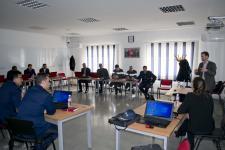As part of the SPEAR project, UN-SPIDER and ZFL engage in a number of activities related to raising awareness about the benefits of space-based information for disaster management, developing Earth-observation-based knowledge products to be used by civil protection agencies and other relevant stakeholders, providing technical advisory support to African partners, fostering knowledge management and strengthening partnerships. This page provides an overview of these activities.
From 22nd to 24th October, more than 700 stakeholders involved in disaster risk reduction in Africa are gathering in Windhoek, Namibia, under the umbrella of the 9th Africa Regional Platform for Disaster Risk Reduction, to discuss how best to advance efforts to achieve the seven goals of the Sendai Framework for Disaster Risk Reduction 2015-2030.
During these three days, representatives from national disaster management and other government agencies, international and regional organisations, as well as experts from the private sector, NGOs and academia, will discuss and agree on ways to accelerate the implementation of the Sendai Framework, as well as other international agendas, including the 2030 Agenda for Sustainable Development and Agenda 2063: The Africa We Want.
This 9th session is hosted by the Government of Namibia and organised by the United Nations Office for Disaster Risk Reduction (UNDRR) and the African Union… Read more
From 20th to 24th October, the United Nations Office for Disaster Risk Reduction (UNDRR), the African Union Commission (AUC), the Southern African Development Community (SADC), and the Republic of Namibia are organizing the 9th Session of the Africa Regional Platform for Disaster Risk Reduction in Windhoek, Namibia. The session kicks off with several events including the Early Warnings for All Multi-Stakeholder Forum for Africa, which brings together a wide range of stakeholders from many African countries, as well as other regional and international organisations. UN-SPIDER and ZFL staff are participating in this forum and in this session of the African Platform for Disaster Risk Reduction.
The Multi-Stakeholder Forum was inaugurated by high-ranking authorities from UNDRR, AUC, SADC, the Regional Office for… Read more
Disaster response efforts benefit substantially from the use of information on the geographical extent of the hazard that triggered the disaster. For example, maps of the geographical extent of floods allow disaster managers to become aware of all the communities and assets that may have been affected. Such maps allow disaster managers to estimate the number of people that may seek temporary shelter in safe areas, to identify crops and critical infrastructure that may have been affected, roads that can still be used to deliver humanitarian assistance to affected areas, and the identification of other roads which can no longer be used because they are flooded.
Satellite imagery has been, for the past three decades, the key source of geospatial data to generate such maps of affected areas. With the advent of radar imagery, flooded areas could be identified even under cloudy conditions. However, unwanted reflections of radar signals from buildings and vegetation in flooded areas… Read more
In March 2015, 187 Members States of the United Nations launched the Sendai Framework for Disaster Risk Reduction 2015-2030. The framework called for the implementation of efforts at the local, national, regional, and international levels to confront the challenges posed by natural and anthropogenic hazards. Targets included a substantial reduction in global disaster risk mortality, the number of affected people, disaster-related economic losses, and impacts to critical infrastructure.
Recognizing the usefulness of space technologies in contributing to the implementation of the Sendai Framework for Disaster Risk Reduction, between June of 2019 and June 2024, the UN-SPIDER programme of the United Nations Office for Outer Space Affairs (UNOOSA) and the Center for Remote Sensing of Land Surfaces (ZFL) of the University of Bonn implemented… Read more
The United Nations Office for Outer Space Affairs (UNOOSA) and the University of Bonn have renewed their partnership, reinforcing their commitment to leveraging space technology in response to growing threats from natural and human-made disasters. This five-year agreement, signed today in Vienna, extends the "Spaceborne Earth Observation Applications for Emergency Response and Disaster Risk Reduction" (SPEAR) project, focusing on African nations.
Hazards continue to endanger lives, displace communities, and undermine global sustainable development. Satellite-based Earth observation is an essential tool in mitigating these impacts, providing timely and detailed data for disaster risk assessment, emergency response, and recovery. SPEAR II will enhance these capabilities, particularly in vulnerable regions, by ensuring that space-based information… Read more

